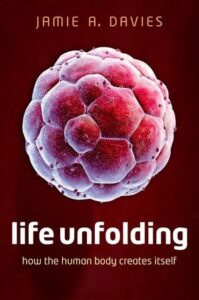 Life Unfolding, Jamie T. Davies
Life Unfolding, Jamie T. Davies
Well, now I feel silly that I didn’t read this before my human biology exam! It describes, in very careful detail, how the human body builds itself, beginning at the point an egg is fertilised. It explains processes like cell division and gastrulation, and generally manages to make the whole complex process comprehensible. Davies doesn’t get hung up on quantum biology or how consciousness is generated, but instead focuses on the physical processes by which the human body grows.
You may not find this entirely satisfying, because Davies very much relies on the fact that small events — a chemical gradient, a lack of symmetry in a cell — seem to prompt massive changes. If you feel (like this reviewer) that it’s quite impossible for all this to happen just by a number of useful proteins happening to bump into each other in a sea of proteins which won’t interact at all, you’ll find this unsatisfying. There seems to be no room for a guiding ghost in the machine. But that is the best understanding we have, I’m afraid — and as a biologist, it makes sense to me. Which is not to say that it’s all perfectly understood: it isn’t. Sometimes, we can’t do the experiments in a human context for ethical reasons. Sometimes, the data is just too difficult to obtain. But the fact remains that we do have a reasonable understanding of embryology, and that is described in this book.
I found it an easy and fascinating read, and would definitely recommend it if you have an interest. It doesn’t get too technical as far as I’m concerned (but take that with a pinch of salt, since I have admittedly studied human biology). At a couple of points I found it useful to look up relevant Khan Academy videos to get a differently-worded explanation of the same events, taken step by step, but that’s as much down to individual learning and teaching styles as anything.

Leave a Reply